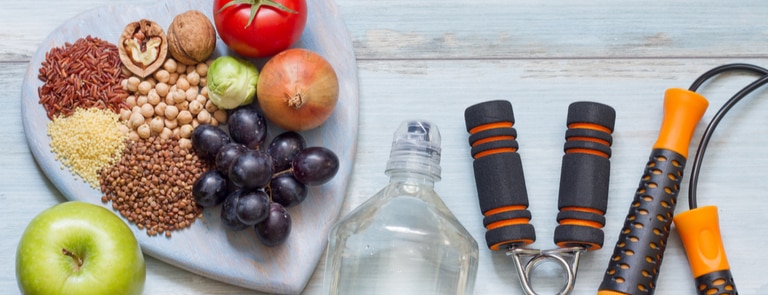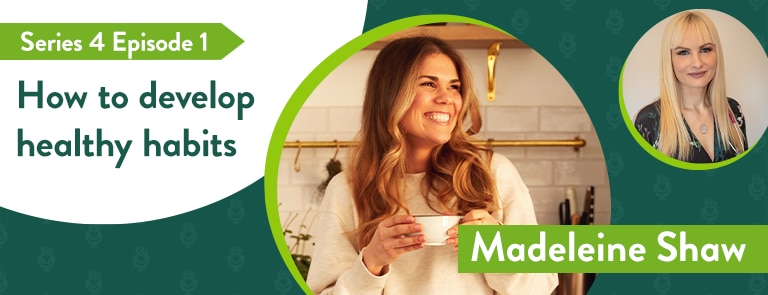33 healthy habits that you should aim to do

While they may be hard to develop, everyone should aim to incorporate healthy habits into their lifestyle.
This often requires a shift of mindset and a dose of self-discipline – but that doesn’t mean it can’t be done.
Healthy habits should help you to achieve your goals, whether they’re to do with your fitness levels, body weight or mental wellness.
Find out some of the best healthy habits to add to your daily routine below.
In this article, you’ll learn about
- Why are good daily habits important?
- How to get into healthy habits
- 33 healthy habits to live by
- What are your top 3 healthy habits?
- What is the most important healthy habit?
Why are good habits important?
Healthy habits are important to adopt because they may be able to protect you from ill health, including things like obesity and potentially type 2 diabetes.1
But that’s not all.
Developing positive habits like eating healthily, exercising regularly and looking after your mind may be able to prevent excessive weight gain and support your energy levels.
How to get into healthy habits
So, you want to improve your lifestyle, but how can you do it?
It’s worth knowing about the four stages of changing a health behaviour, which are:
- Contemplation: you’re thinking that you want to make a change, but you’re not ready to get stuck in straightaway
- Preparation: you’ve decided that you are going to make lifestyle changes and you’re figuring out which steps you’re ready to take, as well as making a plan of action.
- Action: you’ve started to do the changes you’ve been planning for and you’re adjusting to your new routine.
- Maintenance: one of the hardest stages, you’ve kept up your new healthy habits for the past six months or so, with ups and downs but you’ve progressed past them and kept it up. 2
If you’re reading this blog it’s likely that you’re somewhere between the contemplation and preparation phase, so how do you move from that stage to actually forming the habits?
Things like setting a schedule, tracking your progress, rewarding yourself, adding variety and showing yourself compassion should all help you to adopt new healthy habits.
Although a study from 2009 found that it can take anywhere between 18 to 254 days to form a new habit and 66 days for a new habit to become automatic.3
33 healthy habits to live by
So what are some good habits to have?
We’ve listed a whole range of different healthy habits for you to try and live by – from dietary habits to wellness activities.
-
Hydrate yourself every morning
We know it sounds obvious, but keeping your body hydrated is crucial for staying healthy.
Water is essential for bodily functions like transporting nutrients to cells, regulating your temperature and lubricating the joints.4
As well as this though, if losing or maintaining your weight is one of your goals, drinking enough water each day could help.
A study from 2019 concluded that high fluid intake had a positive correlation with body composition and body weight, and could be useful for preventing obesity in young adults.5
So a healthy habit that incorporates this is to make sure you drink a large glass of water every morning to set the day off right.
What our expert nutritionist says
“Hydration is one of the most important yet understated factors in health.
Water is roughly 60% of our body weight as it is present in every cell, organ, and tissue.
Therefore, it is easy to see why dehydration can impact negatively on your body systems.
Adequate hydration is needed to aid digestion, water is absorbed by your small and large intestines facilitating the process of expelling waste and transporting nutrients gained from food into the bloodstream.
Dehydration can also impair brain function, affecting memory, attention, and ability to ‘think clearly,’ due to lack of energy.
The brain is made up of roughly 75% water and we now know that even a 2% drop in hydration levels with losses of sodium and electrolytes can affect memory and attention.
The blood contains a high proportion of plasma (the yellow liquid in your blood) which is composed of 90% water.
The cardiovascular system is sensitive to dehydration as it can affect blood concentration and impact blood pressure, muscle and heart function.
Another vital function is the protection of our joints, tissues and spinal cord by cushioning and lubrication within joint fluid.”
-
Eat a nutritious breakfast every morning
Another way to start your day in a healthy way is by making sure to eat a nutritious breakfast every morning.
There’s a reason why breakfast is known as ‘the most important meal of the day’.
Since we’re fasting when we’re sleeping, breakfast helps to replenish your body’s glucose supplies, which in turn help to lift your energy levels and alertness.6
In addition to this, studies have shown that eating breakfast every day is linked to the maintenance of weight loss, meaning it’s a great habit to get into for the long run.
Although it’s even better to make sure your breakfast is a healthy one, which can be hard to do if you have a busy schedule.
Some of the healthiest breakfast foods includes eggs, which are rich in protein and selenium, bananas for a low-calorie sweet alternative, yoghurt for a source of probiotics and porridge for a high fibre and protein option.
What our expert nutritionist says
“Eating breakfast kicks starts your metabolism and provides the energy needed to start the day and help concentration on the tasks ahead.
Try to aim for a balanced breakfast with a combination of fibre, protein and fruits and vegetables, for example, porridge with nuts, seeds and berries or banana.
Skipping breakfast can hinder any weight loss goals, leaving you low in energy resulting in bad food choices later in the day when your blood sugar levels drop rapidly.
Research has found that foods with a lower glycaemic index and higher protein intake at breakfast were found to be associated with higher energy levels.
Glycaemic Index is a rating system for carbohydrate-containing foods and looks at how quickly your food affects the levels of glucose when consumed on its own.”
Top tips
- The best way to ensure you do not skip breakfast if to plan - make sure you have all the ingredients you need beforehand.
- Avoid heavily processed foods which lack in nutritional value, instead choose a balanced meal.
- Do any preparation the night before, to make it easy if you are always busy in the morning
- Make a routine of having breakfast roughly the same time everyday making it an automatic part of your life.
- Try and have breakfast with friends or family to make it an enjoyable experience.
-
Have a cup of green tea with your breakfast
And another one of the healthiest morning habits to get into is to have a cup of green tea with your breakfast.
In its simplest form, green tea can have a whole range of benefits for you and your body.
This is because it is rich in healthy compounds called polyphenols and catechin known as EGCG. It is the latter that is said to provide the medicinal benefits of green tea.7
And the benefits of drinking a morning cup of green tea don’t end there.
Research has also found that green tea has the potential to improve brain function, increase fat burning, reduce bad breath and help you lose weight.8,9,10,11
-
Move your body throughout the day
It sounds simple, but modern-day living and the office job lifestyle can make frequent movement throughout the day much more difficult.
But it can be done, it just has to become a habit!
And just to be clear, we don’t mean you have to do a HIIT workout every 3 hours – simply getting up from your desk and moving your body in a way you find enjoyable a few times a day can have a great impact on your health.
Multiple studies have found various kinds of exercise to improve our mental health, whether it’s an aerobic workout or meditative movement.12
And it’s worth noting that it can improve our physical health too, by reducing the risk of getting major illnesses or gaining weight.13
Top tips
- Take stairs where possible to get the extra steps into your daily exercise.
- Park the car further away when you need to go out in public to get extra walk time in.
- There are many workout videos starting from 5 minutes available online, try and incorporate them into your daily/weekly routine whenever you have a little free time.
- Make the effort to go for walks, even 10 minutes a day has been seen to be effective in improving health.
- If you have children get them involved in your physical activity (walking, cycling, swimming or workouts) making it an enjoyable family experience.
-
Plan your meals in advance
Another habit that healthy people often live by is meal planning.
Being organised is key, so the best thing to do before you write your shopping list is to flick through a recipe book to inspire yourself and then choose a few to try in the week.
From breakfast right through to dinner, planning your meals in advance may help you to avoid the temptation of getting a takeaway or eating ready meals, as you’ll know you have all the ingredients to cook something tasty for yourself.
Meal planning has also been researched by scientists, who found that those who did it tended to have a healthier diet and lower levels of obesity.14
-
Limit artificial foods
Linking to the last habit, it’s a good idea to prioritise eating proper, whole foods for your health.
This means to stick to foods that don’t have any added ingredients that you can’t pronounce and to try and eat as much minimally processed foods as possible.
Recent research has found that one in five people in the UK eat a diet that consists of 80% ultra-processed foods, which studies have proven can lead to overeating, weight gain, an increase in the hunger hormone and a decrease in the fullness hormone.15
While it would be incredibly difficult to eliminate these foods completely, it’s recommended to build a habit to limit them as much as possible.
-
Replace sugary drinks with water
Another healthy habit to get into is drinking water instead of sugary drinks.
Major sources of added sugar, sugary drinks such as fizzy pop and fruit juices add empty calories and sugar to your diet, so it’s best to just stick to the simple stuff – water.
Moreover, a study from 2012 on replacing caloric beverages with water or diet drinks concluded that doing so could lead to weight loss, with average weight losses of 2-2.5% taking place after the trial.16
-
Limit your screen-time
Limiting screen time not only frees up your day to make way for your new healthy habits, but it could also have a beneficial effect on your mental health.
On the other hand, too much screen time can potentially cause eye pain, neck and shoulder stiffness, sleep deprivation, increased insulin levels and buildup of fat in the bloodstream.17
In addition to this, one study found that limiting screen time (outside of work) to just 30 minutes a day significantly improved the participant’s well-being.18
-
Eat a rainbow of foods
Instead of counting calories and restricting yourself, one of the healthiest habits you can get into is to eat a whole rainbow of foods – or as much colour as you can in your meals!
It can be convenient to just eat processed, ready made beige foods but this isn’t the best for your health.
In fact, the phytochemicals that give fruit and vegetables their vibrant colour are thought to be beneficial.
This is because they contain antioxidants, which can help your body to protect itself from ill health.19
Red foods such as tomatoes, red berries and red coloured seafood contain antioxidants called lycopene, anthocyanins, ellagic acid and astaxanthin.
Orange foods, such as orange peppers, sweet potato, pumpkin, mangoes and nectarines contain carotenoids, including alpha-carotene and beta-carotene.
Green foods like cabbage, kale, Brussels sprouts and pak choi contain antioxidants such as chlorophyll, lutein and zeaxanthin.
And blue or purple-toned foods, from red cabbage to beetroot and blackcurrants, also contain anthocyanins.
All of these different antioxidants have been studied and have been found to be beneficial for our health.20
-
Pay attention to your posture
Whether it was your granny or your teacher in school, most of us have been told to sit or stand up straight at some point in our lives.
And there’s a good reason.
Poor posture has been linked to stress incontinence, constipation, heartburn and slowed digestion.21
Whereas good posture has also been found to improve confidence levels in your own thoughts, decrease the risk of depression, help with breathing and support your back.22,23,2425
-
Keep on learning
Another healthy habit to adopt is to lean into your curiosity? What interests you? What do you want to find out more about? Or get better at?
Not only does it help us to spend less time on our screens, but there are also scientific benefits to learning something new.
Research shows that developing new skills can improve your mental wellbeing, as it helps to boost your confidence, build a sense of purpose and help you to connect with others.26
Whether it’s teaching yourself how to cook, working on your career skills, fixing an object or learning a new language, this is a great healthy habit to develop.
-
Schedule in your workouts for the week
Some of the healthiest people have a workout schedule that they stick to without fail.
If you don’t use one, it can be harder to stay committed to achieving your fitness goals, workout as many times as you want to and stay consistent with your training.
Instead of simply saying, ‘I’m going to do exercise three times a week, get into the habit of actually planning those three times into your schedule.
-
Aim for eight hours of sleep a night
The importance of sleep cannot be understated – which is why we’ve included it as a positive habit to live by.
Poor sleep has been linked to a number of different negative impacts on our health, such as weight gain, increased calorie intake, worsened brain function and more.27,28,29
The National Sleep Foundation guidelines suggest that adults should aim for between seven and nine hours of sleep to enable you to be fully rested.30
What our expert nutritionist says
“Sleep is the time when the body undergoes rest and repair.
It is recommended to get 8 hours of good quality sleep to maintain good health.
Lack of sleep can cause short term effects such as low mood, increased appetite, low energy and fatigue.
In the long-term lack of sleep has been seen to affect your immune system making you more susceptible to catching common colds.
Sleep boosts mental wellbeing and individuals suffering from anxiety and depression have been seen to have consistently less sleep than those in better psychological health.”
Top tips
- Get to bed 30-60 mins earlier than your unusual bedtime, for some settling to sleep can take time reducing your overall sleep time so allowing yourself extra time can help improve sleep quantity and quality.
- Avoid TV and tablets too close to your bedtime as they can stimulate the brain making it harder to ‘wind down’ instead read a book or listen to soft calming music.
- Have a bath with relaxing mineral salts to help relieve your muscles, if you’re relaxed you’re more likely to drift off to sleep easier.
- Lavender essential oil has a calming effect on the nervous system, using a few drops on your pillow or in an oil burner can help promote feelings of calmness before bed.
-
Don’t smoke
It goes without saying that smoking is bad for your health.
So try and make a habit of not smoking. The NHS states that stopping smoking helps you with the following:
- Breathing easily
- Coughing less often
- Feeling more energetic
- Feeling less stressed
- Having better sex
- Improving fertility
- Having better skin
- Improving smell and taste
- Having whiter teeth31
-
Make sure to rest your body
While regular exercise is a great habit to get into, so is regular rest.
It’s important to allocate a couple of rest days a week where you allow your body to recover, as this is especially significant for aiding muscle growth.
Experts advise to avoid training the same group of muscles for two days in a row.32
-
Work on your balance
On the topic of exercise, another great healthy habit is to include exercises that develop your balance into your schedule.
This includes anything from yoga, to tai chi and pilates. Balance training like this is often used to strengthen the muscles that keep you upright, as well as improving stability.
One study from 2019 also found that balance and coordination exercises helped to improve quality of life.33
-
Differentiate between cravings and hunger
Sometimes we confuse food cravings with actual hunger, which can lead to excessive snacking on some foods that aren’t so good for us.
A good habit to get into is to get in tune with your body and understand when we’re hungry and when we’re just craving something.
If so, you can learn to snack on nutritious foods to fill you up temporarily instead of empty calories.
And if it is that you’re craving something a little on the unhealthy side, allow yourself a small portion of whatever it is to satisfy it.
-
Cook your own meals from scratch
This is another habit that healthy people often do – cooking your own meals from scratch.
That way, you can ensure that you’re limiting any artificial ingredients.
As well as this, cooking your own meals means you can make sure your portion sizes aren’t too big, save on time from heading out to eat, save money that you would have spent on takeaways and you can develop your cooking skills and learn to love the process.
-
Incorporate strength training into your schedule
Whether you use resistance bands, free weights or the weight of your own body, strength training can have a positive impact on your health.
Not only does it make you stronger, but it also helps you burn more calories when you rest, reduce your abdominal fat, decrease your risk of injuries and support your heart health.34,35,36,37
-
Order your drinks straight
If you enjoy an alcoholic beverage on the weekend, you may want to get into the habit of ordering it straight.
That way, you can reduce the number of calories and sugar that you’ll be consuming throughout the night – just remember to drink responsibly as you may get through them faster.
-
Get outside everyday
From a gentle walk around the park to hiking up a mountain, getting outside every single day is a really healthy habit to get into.
It not only rises your vitamin D levels, it can also help to improve your mood, reduce stress or anger, aid relaxation, improve your confidence, make new connections and obviously be more active.38,39
-
Prepare your snacks in advance too
As well as preparing your meals in advance, a positive habit to get into is to prepare your snacks in advance too.
That way, you can ensure that you have a range of tasty and nutritional treats ready for you to enjoy – without derailing yourself from your health kick!
-
Practice mindfulness
Mindfulness is a practice where you actively pay more attention to the present moment.
Whether it’s your thoughts, feelings or to your current surroundings, mindfulness can aid your mental wellbeing.
It also helps us to stop taking things for granted and better understand when our unhelpful thoughts are taking over.40
-
Allow yourself treats every now and then
When it comes to forming healthy habits, it can seem like you have to restrict yourself from all the things you once enjoyed.
And like with exercise and being sure to rest your body, you can also allow your body food that isn’t so healthy every now and then – providing you’re eating a nutritionally balanced diet the majority of the time.
-
Write down your goals
The act of writing down your goals is another positive habit to get into, as it can help you distinguish exactly what it is you want to achieve and therefore a clearer path to success.
This has also been studied by Dr Gail Matthews, who trialled the efficiency of writing down your goals, and she found that those that did so accomplished significantly more than those who didn’t.41
-
Be consistent
Ever heard the phrase, “consistency is key”?
There’s a reason why it’s so popular. When it comes to achieving any kind of goals, whether they’re fitness, skills or career related, being consistent helps to build momentum and therefore progress.
What’s more, being consistent may also allow you to build more trust in yourself and create accountability for yourself so you can track your progress and tweak your behaviour if necessary.
-
Aim for 10,000 steps a day
A healthy habit to form if you’re looking to improve your physical health is to aim to walk 10,000 steps a day – if you’re physically able.
Now this can be hard if you’re working at an office job or you have a medical condition that makes it more difficult, so you could always tweak the goal to 7,000 steps of 5,000 steps to begin with.
The 10,000 steps goal though has been studied, and the results suggested that doing so could improve heart health, mental health and potentially lower the risk of diabetes.42
-
Fuel your body with complex carbs
Carbohydrates are a super important food group as they provide our bodies with energy.
But some are better than others, so it may be worth noting this and trying to eat the good kind instead of the ‘not-so-good’ ones.
Specifically though, we’re talking about eating more complex carbs instead of refined ones. The latter are carbohydrates that have been heavily processed, meaning that a lot of the nutrients are removed, and contain lots of added sugars.
Complex carbs though are generally considered to be whole foods and a lot more nutritious, so it’s best to stick to those if you can.
-
Go easy on condiments
This one might have hit a sore spot – sorry!
But if you’re trying to cut back on calories and processed foods, one easy habit to try is to limit the amount of condiments you have with your meals.
It can be tempting to load up your plate with ketchup, mayo or even brown sauce, but a lot of these foods contain added sugars and often lack nutritional value, so you may want to reduce your use of condiments to one per meal, and stick to a teaspoon or a tablespoon of your favourite one.
-
Be sure to eat healthy fats
For a long time now fats have had a bad rap.
But that isn’t necessarily the case.
While trans fats should be avoided at all costs and saturated fats should be limited, unsaturated or monosaturated fats may actually have some benefits for your health.
These are the fats that usually come from fish or plant oils, and having these instead of other fats may be able to support your heart health and cholesterol levels.43
-
Avoid overeating
Especially the less nutritious foods.
While volume eating vegetables can be a beneficial habit to have, it’s important to not ignore your fullness cues when you’re eating your meal.
If you keep on doing this over time, it will be difficult to know when you’ve actually had enough food, leading you to overeat and feel yuck afterwards.
So it may be worth practicing mindfulness in this instance, slow down, really pay attention to the foods you’re eating and listen to what your body wants.
-
Practice gratitude
Lots of research has been done on the positive effects of being thankful.
Gratitude is often strongly linked to greater happiness, through feeling more positive emotions, better deal with adversity and build stronger relationships.
If you want to make this a habit of yours, try writing down three things you’re grateful for every morning and why.
-
Look after your gut
And another healthy habit we’ve got to share with you is looking after your gut.
Research has found that your gut impacts a lot of different areas of your physical and mental health – so it’s important to provide it with what it needs.
A healthy gut and digestive system helps us to keep viruses, bacteria and fungi at bay - as well as communication with the brain to maintain general health and wellbeing.44
So in order to look after your gut, get into the habit of achieving good sleep, a healthy diet, regular exercise and potentially taking gut supporting supplements.
What are your top 3 healthy habits?
Now you know all of our recommended healthy habits, it might be that you already some of these or a lot of them.
But to help you on your journey, try writing down your top three healthy habits from our list to help you achieve your life goals.
What is the most important healthy habit?
Generally speaking though, you might be wondering what the most important healthy habit is.
And we’d say putting yourself and your health first.
This is so important for staying happy and well in your mind and body, but it also better enables you to look out for others.
The final say
Feeling inspired to try some of these positive lifestyle habits?
Take back control of your life and start your journey to developing these healthy habits today.
How to develop healthy habits with Madeleine Shaw
How to develop healthy habits with Madeleine Shaw
In this episode, we explore Madeleine's morning and evening routines, her favourite healthy snack ideas for on the go, how to meditate and why it provides so many people with comfort, plus tips on instilling healthy habits in the generation to come.


Last updated: 26 October 2021
- https://www.niddk.nih.gov/health-information/diet-nutrition/changing-habits-better-health
- https://www.niddk.nih.gov/health-information/diet-nutrition/changing-habits-better-health
- http://citeseerx.ist.psu.edu/viewdoc/download?doi=10.1.1.695.830&rep=rep1&type=pdf
- https://www.cdc.gov/healthyweight/healthy_eating/water-and-healthier-drinks.html
- https://www.ncbi.nlm.nih.gov/pmc/articles/PMC6723835/
- https://www.betterhealth.vic.gov.au/health/healthyliving/breakfast
- https://www.ncbi.nlm.nih.gov/pubmed/28864169
- http://onlinelibrary.wiley.com/doi/10.1111/j.1467-3010.2007.00665.x/full
- https://journals.physiology.org/doi/full/10.1152/ajpregu.00832.2005?url_ver=Z39.88-2003&rfr_id=ori:rid:crossref.org&rfr_dat=cr_pub%3dpubmed
- https://www.ncbi.nlm.nih.gov/pubmed/18388413
- http://www.sciencedirect.com/science/article/pii/S0031938407004003
- https://www.health.harvard.edu/blog/how-simply-moving-benefits-your-mental-health-201603289350
- https://www.nhs.uk/live-well/exercise/exercise-health-benefits/
- https://www.ncbi.nlm.nih.gov/pmc/articles/PMC5288891/
- https://bmjopen.bmj.com/content/9/10/e027546 https://pubmed.ncbi.nlm.nih.gov/31105044/
- https://academic.oup.com/ajcn/article/95/3/555/4578292
- https://www.straitstimes.com/singapore/health/survey-finds-4-in-10-singaporeans-not-getting-enough-sleep-but-those-above-55-sleep https://www.rallyhealth.com/health/sitting-is-it-the-new-smoking
- https://guilfordjournals.com/doi/10.1521/jscp.2018.37.10.751
- https://www.bhf.org.uk/informationsupport/heart-matters-magazine/nutrition/5-a-day/colourful-foods
- https://www.bhf.org.uk/informationsupport/heart-matters-magazine/nutrition/5-a-day/colourful-foods
- https://www.health.harvard.edu/staying-healthy/3-surprising-risks-of-poor-posture
- https://www.sciencedaily.com/releases/2009/10/091005111627.htm
- https://biofeedbackhealth.files.wordpress.com/2011/01/a-published-increase-or-decrease-depression.pdf
- https://www.ncbi.nlm.nih.gov/pmc/articles/PMC6077663/
- https://www.health.harvard.edu/pain/4-ways-to-turn-good-posture-into-less-back-pain
- https://www.nhs.uk/mental-health/self-help/guides-tools-and-activities/five-steps-to-mental-wellbeing/
- http://onlinelibrary.wiley.com/doi/10.1038/oby.2007.118/full
- https://www.ncbi.nlm.nih.gov/pmc/articles/PMC535701/
- https://www.ncbi.nlm.nih.gov/pubmed/10984335
- https://www.sleepfoundation.org/how-sleep-works/how-much-sleep-do-we-really-need
- https://www.nhs.uk/live-well/quit-smoking/
- https://www.move.va.gov/docs/NewHandouts/PhysicalActivity/P32_SampleStrengthActivityPlanForBeginners.pdf
- https://www.frontiersin.org/articles/10.3389/fnagi.2019.00318/full
- https://www.ncbi.nlm.nih.gov/pmc/articles/PMC4535334/
- https://pubmed.ncbi.nlm.nih.gov/32804997/
- https://pubmed.ncbi.nlm.nih.gov/31136542/
- https://www.ncbi.nlm.nih.gov/pmc/articles/PMC6563593/
- https://www.health.harvard.edu/press_releases/spending-time-outdoors-is-good-for-you
- https://www.mind.org.uk/information-support/tips-for-everyday-living/nature-and-mental-health/how-nature-benefits-mental-health/
- https://www.nhs.uk/mental-health/self-help/tips-and-support/mindfulness/
- https://www.dominican.edu/sites/default/files/2020-02/gailmatthews-harvard-goals-researchsummary.pdf
- https://pubmed.ncbi.nlm.nih.gov/29361921/
- https://www.nhs.uk/live-well/eat-well/different-fats-nutrition/
- https://health.ucdavis.edu/health-news/newsroom/what-is-gut-health-and-why-is-it-important/2019/07





